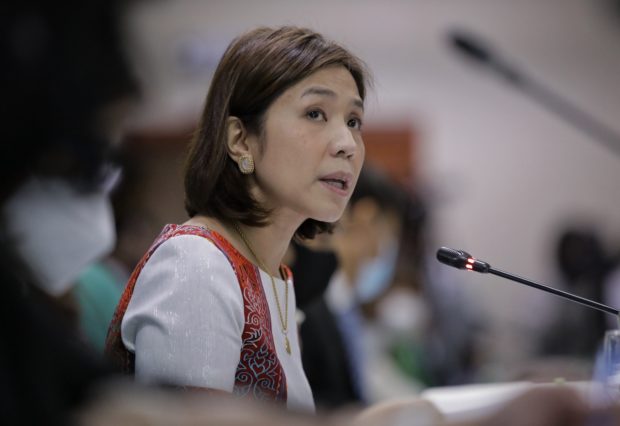DBM vows open governance after PH slips in budget transparency rankings

FILE PHOTO: Budget Secretary Amenah Pangandaman on Wednesday, September 14, 2022, presents to the members of the Senate committee on finance the highlights of the proposed P5.268 trillion 2023 national budget. (Joseph Vidal / Senate PRIB)
MANILA, Philippines — Department of Budget and Management (DBM) Secretary Amenah Pangandaman said that the agency is committed to open governance after the Philippines fell eight places in an international budget transparency survey for 2021.
According to the 2021 Open Budget Survey (OBS), the Philippines scored 68 out of 100 for transparency, 35 out of 100 for public participation and 74 out of 100 for budget oversight.
In response to the results, Pangandaman said that the DBM is “committed to continuing working towards an open and participatory government as we chair the Philippine Open Government Partnership.”
The DBM will also “take the recommendations of the OBS to heart and study the feasibility of introducing this in our processes,” said the DBM chief.
“It is vital that we realize that open government does not only benefit the system, rather its advantage cascades to different sectors of society. It creates more stable conditions to incentivize investments from the private sector, sets the stage for ensuring public trust, and strengthens the country’s democratic institution’s principles,” Pangandaman stated.
Article continues after this advertisementDBM Assistant Secretary Rolando Toledo also vowed that the Philippines will rank higher next year.
Article continues after this advertisement“Currently the budget documents produced by the DBM are now published and it is assured that we have a higher score compared to the next cycle. Improvements of the score of the key budget documents under the DBM based on some of IBP’s recommendations are also included in the documents,” Toledo said.
These comments from the DBM came during the 2021 OBS Public Forum organized by the La Salle Institute of Governance, in partnership with Stratbase Albert Del Rosario Institute and International Budget Partnership (IBP).
La Salle Institute of Governance Senior Fellow Francisco Magno, who is also an OBS independent expert for the Philippines, presented the survey results during the forum. He also stressed the significance of digitalization for budget transparency.
“The gold standard nowadays for effective budget transparency is digitalization, providing information on public websites, the timeliness of the information, and the comprehensiveness of the content, including the eight key budget documents,” Magno said.
Also present during the forum was Philippine Chamber of Commerce and Industry President George Barcelon, who emphasized the importance of budget transparency.
“Every local government official should take it upon themselves that people may not be complaining, but they have to look at their systems, and the quality of the process must be reviewed. And if they can reduce the time in helping the private sector and establishments file their papers, that would be a big help,” said Barcelon.
According to the IBP’s website, the OBS is an international, independent fact-based instrument that uses criteria to assess a public’s access to their national government’s budget information.
Proponents said the OBS is grounded on a thorough and objective methodology that has been examined by independent experts and that it evaluated three components of open budgeting: budget transparency, or the Open Budget Index (OBI), public participation, and budget oversight.
Results of the survey are based on a 228-question questionnaire completed by researchers normally located in the country being studied, they added.
For the latest OBS, the IBP said assessments were made on published documents, events, and activities that took place until December 31, 2020.
La Salle’s Magno also accomplished a questionnaire, as each country was required to have an independent budget expert weigh in, it noted.
“[E]ach country’s draft questionnaire is also reviewed by an anonymous independent expert, and in [the] Philippines by a representative of the Department of Budget and Management,” it added.
RELATED STORIES
DBM okays release of P335-M tax shares of BARMM
DBM releases P5.2 billion for 9.8 million beneficiaries of targeted cash transfer